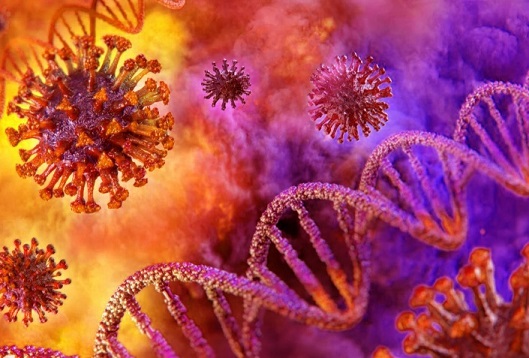Belgium Scientists Provide New Insights into DNA Methylation, Telomere Length and Immune Function in Long COVID Patients
Nikhil Prasad Fact checked by:Thailand Medical News Team Feb 04, 2025 2 months, 1 week, 2 days, 6 hours, 45 minutes ago
Medical News: Long COVID, also known as post-acute sequelae of SARS-CoV-2 infection, continues to puzzle scientists and healthcare professionals worldwide. It affects millions of people, leaving them with persistent symptoms that can last months or even years after the initial infection. Researchers from KU Leuven, UZ Leuven, and other institutions in Belgium have recently conducted an in-depth study to explore the biological mechanisms that might contribute to Long COVID. Their findings shed new light on how DNA methylation, telomere length, mitochondrial DNA content, and immune function might play a role in this complex condition.
 Belgium Scientists Provide New Insights into DNA Methylation, Telomere Length and Immune Function in Long COVID Patients
The Biological Factors Behind Long COVID
Belgium Scientists Provide New Insights into DNA Methylation, Telomere Length and Immune Function in Long COVID Patients
The Biological Factors Behind Long COVID
Long COVID is characterized by lingering symptoms such as fatigue, sleep disturbances, cognitive issues, and muscle pain. This
Medical News report highlights how biological markers, including telomere length and mitochondrial DNA, could be linked to these symptoms. The study involved a prospective observational cohort of 358 patients infected with SARS-CoV-2 between March 2020 and March 2022, with follow-ups conducted between 4 to 24 months post-infection. Among them, 328 were hospitalized, with a significant portion requiring intensive care, while 30 were outpatient cases with persistent symptoms.
Researchers collected blood samples from participants to measure various biological factors. The study specifically examined:
-DNA Methylation: A key process that regulates gene expression
-Telomere Length: A marker of cellular aging and stress
-Mitochondrial DNA Content: A crucial factor for cellular energy production
-Inflammatory Cytokines: Indicators of immune system function
-Serological Markers: Including troponin T, D-dimer, and C-reactive protein
Key Study Findings
One of the most striking discoveries was the association between telomere shortening and the persistence of Long COVID symptoms, particularly fatigue and post-exertional malaise. Patients with Long COVID had significantly shorter telomeres compared to those who fully recovered. Telomere length is known to reflect cellular aging, and its reduction suggests that Long COVID may accelerate biological aging in affected individuals.
Mitochondrial DNA content was also found to be lower in Long COVID patients, especially those experiencing severe fatigue. Since mitochondria are responsible for producing energy in cells, a reduction in mitochondrial function could explain the overwhelming exhaustion reported by many Long COVID sufferers.
Additionally, researchers observed widespread hypomethylation in patients with persistent symptoms. DNA methylation plays a critical role in regulating genes involved in immune response and inflammation. Changes in this process could lead to immune system dysregulation, potentially explaining why Long COVID patients continue to exper
ience symptoms long after clearing the initial viral infection.
Another critical biomarker identified was troponin T, which is commonly associated with cardiac injury. The study revealed that higher levels of troponin T were present in Long COVID patients, particularly those with fatigue and exertion-related symptoms. This suggests that heart-related complications might contribute to persistent symptoms and should be considered when evaluating patients.
Different Clusters of Long COVID Symptoms
The study also categorized Long COVID patients into six distinct clusters based on their symptoms:
-PEM-Fatigue Cluster: Includes post-exertional malaise, fatigue, and sleep disturbances
-Cognitive Dysfunction Cluster: Characterized by memory loss and attention deficits
-Visceral Problems Cluster: Involves stomach pain, bloating, and other digestive issues
-Autonomic Symptoms Cluster: Features unsteadiness, cold extremities, and temperature dysregulation
-Immune Disturbances Cluster: Includes recurrent infections and prolonged inflammation
-Neurological Symptoms Cluster: Consists of headaches, dizziness, and nerve pain
Interestingly, the PEM-fatigue cluster was the most common, affecting nearly half of all Long COVID patients in the study. This group also exhibited the most significant biological changes, including reduced telomere length, lower mitochondrial DNA content, and higher levels of troponin T.
Implications for Future Research and Treatment
These findings provide valuable insights into the biological underpinnings of Long COVID. Understanding the role of telomere length, mitochondrial function, and immune dysregulation could pave the way for targeted therapies to alleviate symptoms. For example, treatments aimed at supporting mitochondrial health and reducing oxidative stress may benefit Long COVID patients experiencing fatigue and energy depletion.
Cardiac monitoring should also be considered for Long COVID patients with elevated troponin T levels, as this could indicate underlying heart complications. Similarly, interventions to restore DNA methylation balance might help regulate immune function and reduce inflammation in affected individuals.
Conclusion
The study underscores that Long COVID is not a singular condition but rather a collection of overlapping syndromes with distinct biological signatures. The identification of telomere shortening, mitochondrial dysfunction, and immune dysregulation as key factors provides a foundation for future research into potential treatments.
Moreover, the clustering of symptoms suggests that a one-size-fits-all approach may not be effective in managing Long COVID. Instead, personalized treatment strategies tailored to specific biological markers could offer more effective relief for patients.
With millions of people still struggling with Long COVID, further research is crucial to developing interventions that can restore quality of life for those affected.
The study findings were published in the peer-reviewed journal: BMC Medicine.
https://link.springer.com/article/10.1186/s12916-025-03881-x
For the latest on Long COVID, keep on logging to Thailand
Medical News.
Read Also:
https://www.thailandmedical.news/news/breaking-university-of-vermont-scientists-confirms-that-sars-cov-2-has-ability-to-damage-human-dna-and-telomeres-causing-long-covid-issues
https://www.thailandmedical.news/news/covid-19-shortens-leukocyte-telomere-length-but-this-is-not-associated-with-cognitive-impairment-issues
https://www.thailandmedical.news/news/breaking-study-discovers-sars-cov-2-could-be-carcinogenic-as-it-causes-mutagenesis,-telomere-dysregulation-and-impairs-dna-mismatch-repair
https://www.thailandmedical.news/news/covid-19-causes-blood-dna-methylation,-a-potential-biomarker-for-long-covid-severity
https://www.thailandmedical.news/news/yale-researchers-warn-of-dna-methylation-dysregulation-in-long-covid
